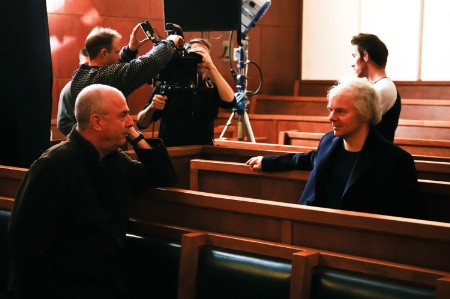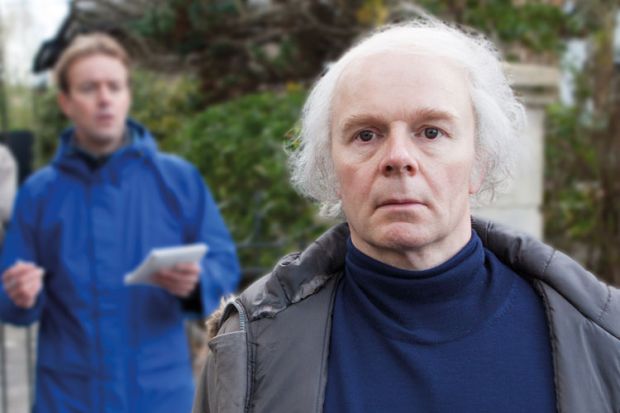The Lost Honour of Christopher Jefferies
Written by Peter Morgan
Directed by Roger Michell
Produced by Kevin Loader
Starring Jason Watkins, Ben Caplan, Shaun Parkes, Peter Polycarpou
ITV1, 10 and 11 December 2014
Michell agreed to film the ‘irresistible’ script, but insisted that his old teacher approve it because, he says, ‘This is a love letter to Christopher Jefferies’
Snow is falling on Clifton Village as Christopher Jefferies makes his way to buy bread. It seems an idyllic scene, but it is soon to go most horribly wrong.
It will go fatally wrong for Joanna Yeates, the landscape architect whose disappearance on 17 December 2010 made headline news, and whose snow-covered body was found in a field across the suspension bridge on Christmas Day. Today however, the story is remembered not only for her murder, but also for the destruction of the reputation of the retired schoolteacher who was arrested on suspicion of her murder.
Clifton under snow provides the opening sequences for The Lost Honour of Christopher Jefferies, a two-part television drama written by Peter Morgan and directed by Roger Michell. It is a high-powered combination. Morgan is acclaimed for his scripts for The Queen, Frost/Nixon and Rush; Michell for his work for the stage, including the Royal Shakespeare Company, and later for films such as Notting Hill, Hyde Park on Hudson and Le Week-End. The Yeates/Jefferies story is dramatic in itself: Michell describes it as a “perfect storm” of a crime in which “everything conspired to make this utterly captivating as a narrative”.
But there is a second story: the story of the making of the programme itself, a story with its own dramatic twists. Underlying both is a subtext: the responsibilities of making drama out of fact, for which The Lost Honour provides an excellent case study. The three strains run in parallel, the divergences and confluences heightening the fascination of the total combination.
The basic story will be familiar to those who followed both the murder and its media aftermath. Joanna Yeates lived with her boyfriend in a house divided into flats, in Clifton, an attractive urban village in Bristol. One night while her partner was away, she disappeared. For days, police, media and public tried to piece the clues together, prior to the discovery of her body in the nearby countryside. Her landlord and neighbour, Christopher Jefferies (played in the drama by Jason Watkins), was ambushed by the press outside the house in Canynge Road. Jefferies had been an English teacher at nearby Clifton College, a public school with imposing Victorian Gothic buildings and its famous Close, recalled in the poetry of Sir Henry Newbolt.
The “perfect storm” gathered in intensity as Jefferies was arrested and questioned for three days by Avon and Somerset Police. While he remained in custody, the media had an extended field day with lurid headlines and scandalous background stories about the eccentric bachelor and former schoolteacher and his unconventional existence.
Eventually, another neighbour, Dutchman Vincent Tabak (played by Joe Sims), was arrested and confessed to Yeates’ murder. Jefferies was released, only to find his reputation in tatters as a result of what Michell describes as the “torrent of sewage” printed in the papers while he was in custody. The remainder of The Lost Honour chronicles Jefferies’ mission to restore his good name, calling the press to account for their deeply hurtful distortions and inventions.
Watching the real-life drama unfold in 2010 was an increasingly incredulous Roger Michell. He is both an Old Cliftonian and a former pupil of Jefferies, and the man depicted in the media was not one he recognised. On the day his former teacher was released from police custody, Michell rang his old schoolfriend Clive Panto and asked him if he knew anything about the case.
Panto replied: “I do, actually. Christopher’s upstairs. Would you like to speak to him?”
Cut to 18 months later. Michell is trying to persuade Morgan to write a play for him on another subject and, by a remarkable coincidence, Morgan counters with a script he has already written. “Have you heard about Christopher Jefferies?” asks Morgan. Michell recalls: “I practically fell off my stool.”

Within days, Michell agreed to film Morgan’s “irresistible” script, but insisted that his old teacher personally approve the script because, as Michell puts it today, “This is a love letter to Christopher Jefferies.”
A series of meetings and negotiations ensued, with Jefferies insisting on changes in the interests of accuracy or at least conformity to the “spirit of the event” when it departed from fact. This quickly focused Michell’s attention on the ethical, dramatic and legal tensions involved in making a drama out of a true story. It was the first time he had directed anything based on fact.
“I thought it might be constricting,” he says, “but of course it’s not…it’s enormously liberating. You try and find out in detail what really happened, and then you try and make that truthful, and that gives you licence to behave in ways that you wouldn’t if you were dealing with more conventional narrative.”
Michell speaks earnestly about the importance of detail in storytelling, observing that in this project, “sometimes the least dramatic events were the most surprising”. These included little moments of humanity in the police station, including the custody sergeants’ kindness to the “retired, fragile” Jefferies. The appeal of the ordinariness of detail within high personal drama was, for Michell, “the reverse pattern of making fictional narrative”.
Two examples stand out: one verbal, one visual. In the original script, explains Michell, Jefferies’ three days of questioning followed the predictable television drama format. But just a couple of months before shooting, the police agreed to release the interview transcripts. “They were so linguistically interesting…they read like wonderful David Mamet plays.” But they were also fascinating, adds Michell, “because they were in so many ways banal”.
So, although they showed how frightening the situation was for the suspect, the interviews were not at all as stereotypically dramatic as what Michell calls the typical “burlesque” of cop show convention. The script was changed and the final programme sticks very closely indeed to the actual transcripts.
In terms of visuals, Michell was particularly keen to recreate the “iconic” parka that Jefferies was wearing for the crucial TV interview on Sky News. This had to be made fully bespoke by the costume team as the original had been destroyed by the police forensic team. “It seemed to me that that was the most important costume in the whole show,” he says.
The opening credits of The Lost Honour announce simply: “What follows is drama based on real events”, but the brevity of the phrase belies the depth of thinking – to say nothing of the legal arguments – behind it. “Even a documentary is drama,” Michell argues, a form full of subjective, editorial choices. In accordance with that view, the programme remained essentially factual without seeking to be objective.
Jefferies is clearly the hero and ultimately, as Michell puts it, “the whole thing is this balance between narrative shape and what actually happened”. Again, two examples stand out, both “renunciations” of Jefferies. As the case was unfolding in 2010, Clifton College headmaster Mark Moore appeared on BBC television, coldly (and, it transpires, hurtfully) distancing the school as far as possible from its former teacher of more than 30 years. Michell uses real footage of this interview in his drama. In contrast, scenes in which a local bread-seller – played by Michell’s wife, Anna Maxwell Martin – first refuses to serve and later apologises to Jefferies after his release are “total invention”.
Initially, Clifton College denied permission to film on campus, but “to his credit”, says Michell, the head relented. In the final scenes, fact and fiction come still more subtly together as lawyers for the press apologise in court for their clients’ defamation of Jefferies. Several of these are played, Michell reveals, by a former colleague and former pupils, including Panto and Michell himself. “I thought that would be a nice irony,” he smiles.
Ultimately, however, Michell sees The Lost Honour of Christopher Jefferies as not simply about this particular case, but also as an argument for the right to be eccentric. Jefferies, he says, “and people like Christopher, need our support and our defence”.
Register to continue
Why register?
- Registration is free and only takes a moment
- Once registered, you can read 3 articles a month
- Sign up for our newsletter
Subscribe
Or subscribe for unlimited access to:
- Unlimited access to news, views, insights & reviews
- Digital editions
- Digital access to THE’s university and college rankings analysis
Already registered or a current subscriber? Login

